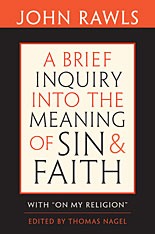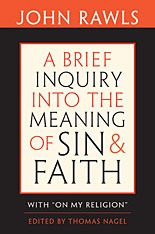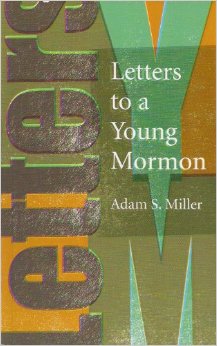Following his experiences in World War II, John Rawls more and more moved away from Christianity. He explains that his difficulties were "always moral ones, since my fideism remained firm against all worries about the existence of God." (Rawls 2010, 263)
Fideism is the view that there cannot be an evidence-based or scientific proof of the existence of God. Since, Rawls’ view of the existence of God was not in question, his departure from Christianity was not an exodus towards Atheism, but instead a move away from Christianity on what he viewed as moral

grounds.
Rawls expression of fideism and his rejection of Atheism (to be addressed later), are interesting to me. While Rawls rejects certain tenants of Christianity, he does not reject religion or the belief in deity as irrational or somehow ridiculous. This is something that sets Rawls, and other political liberals like Martha Nussbaum, apart from many secular thinkers. While they have some disagreements with certain religious ideas, they do not have a hostile or cynical view of religion in general.
Some of the Christian doctrines which Rawls came to view as "…morally wrong, in some cases even repugnant…" included the "doctrines of original sin, of heaven and hell, of salvation by true belief and based on priestly authority." (263-264) He also rejected the strongly the idea of predestination as "terrifying once one thought it through and realized what it meant." (264)
"These doctrines all became impossible for me to take seriously, not in the sense that the evidence for them was weak or doubtful. Rather, they depict God as a monster moved solely by God’s own power and glory," wrote Rawls. This in many ways resonates with me, as I expressed concerns, in my earlier post on faith, about a conception of God which portrays God as a very egotistical being.
Rawls also had misgivings about the history of Christian persecution of heretics and dissenters. He paints this as something new in history as "Greek and Roman religion was civic religion, and it served to instill loyalty to the polis or the Emporer especially in time of war and crisis. They insisted on this, but beyond that civil society could be largely free and many different religions flourished in the polis and Empire." (264) Rawls saw a connection between the persecution of dissenters and heretics and the idea that eternal salvation required true belief (264-265).
"To the extent that Christianity is taken seriously, I came to think it could have deleterious effects on one’s character," stated Rawls."Christianity is a solitary religion: each is saved or damned individually, and we naturally focus on our own salvation to the point where nothing else might seem to matter." (265)
While we are going to be concerned about ourselves to some degree, Rawls allows, "our own individual soul and its salvation are hardly important for the larger picture of civilized life…"
The example that Rawls used in addressing the trouble of individual salvation is whether one would assassinate Hitler. Such hypotheticals are hallmarks of moral theory. Rawls asks "…how important is it that I be saved compared to risking my life to assassinate Hitler, had I the chance? It is not important at all." (265 Rawls notes that the German resistance was often hampered about concerns about the ethics of assassination, killing, and specifically the killing of a head of state. For Rawls, all of these concern should have "…were so far outweighed by the enormous evil Hitler perpetuated…"
The concerns which Rawls has in this could easily apply to any number of secular moral perspectives, whether it be deontology, Utilitarianism, or virtue ethics. Yet, what sets them apart from Christianity is the connection with eternal salvation. In moral theory, we are analyzing whether an action is moral, or consistent with the good life, not whether such an action will condemn us to hell. Yet, these are things that religious ethics and moral theology have dealt with as well.
It is worth noting that in his essay "On Religion," Rawls is not making a philosophical argument against Christian theology. This is a personal narrative which explains his personal trajectory and it is intended for friends and family. As a result, this essay is missing further explanation in part that would be philosophically useful. However, given that it was posthumously published, we are left with the text as it is.
In my next post in this project, I will look at how Rawls draws on Jean Brodin at the conclusion "On My Religion" to rather briefly explain what his view of religions later in life was and why he rejects atheism.
Follow this link to see the posts in this series on Rawls and religion.
Follow this link for Approaching Justice posts about John Rawls.












